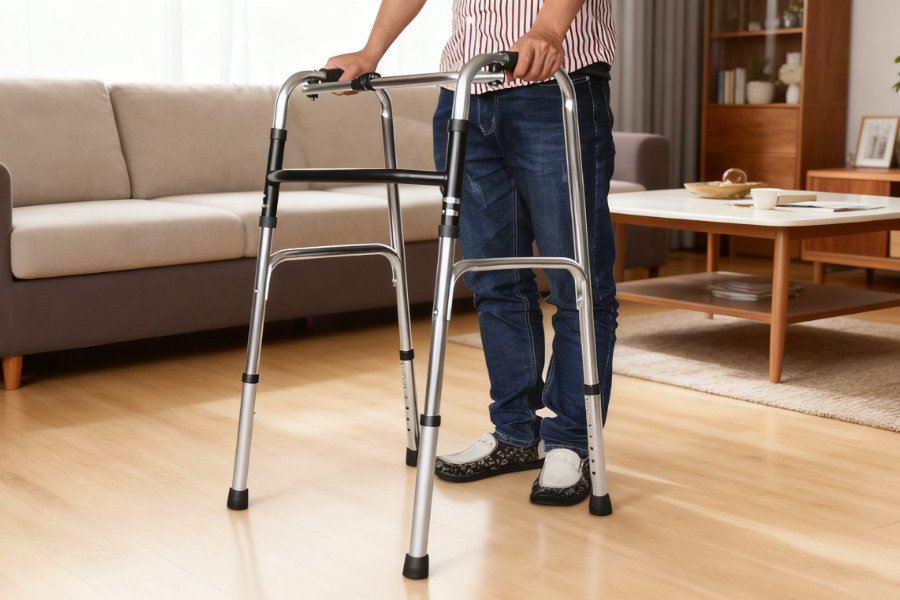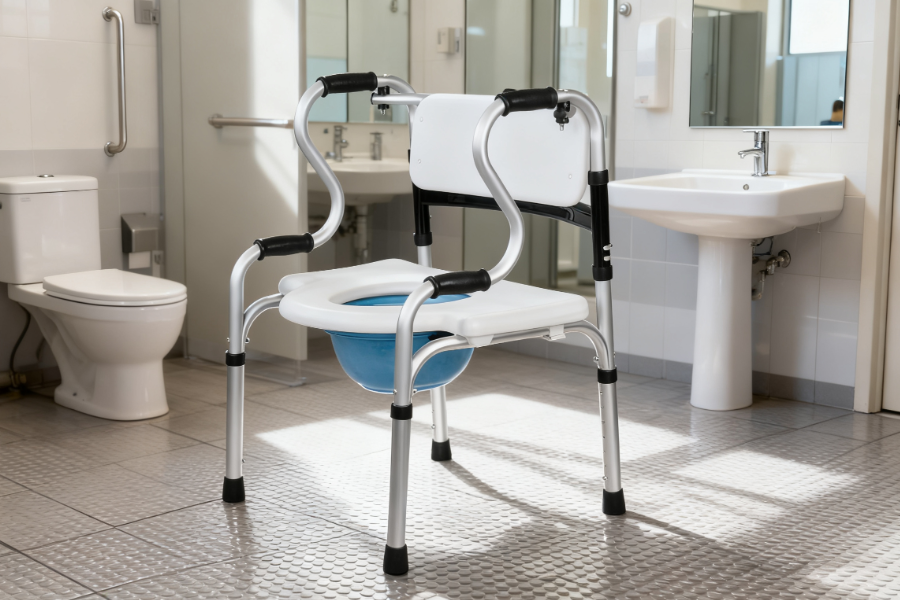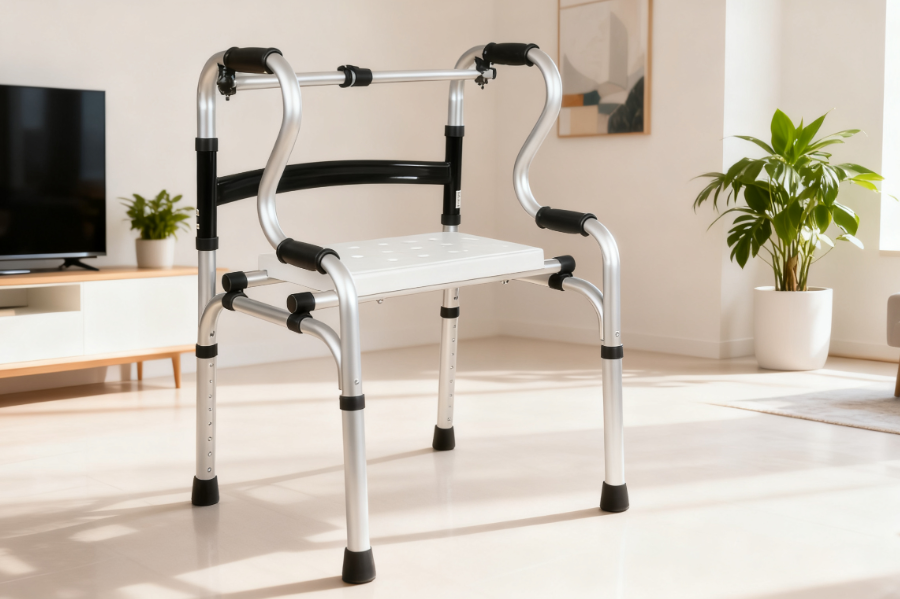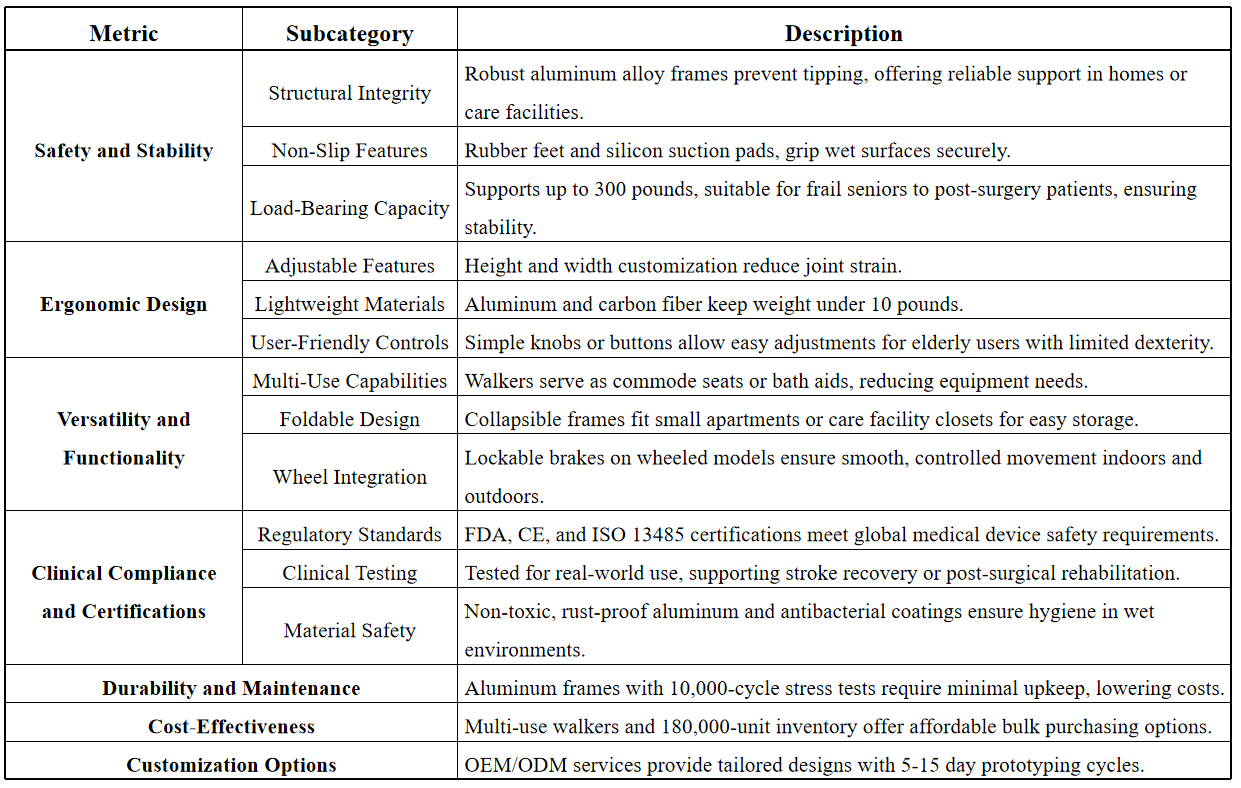In the field of B2B purchasing for mobility aids, selecting the right walker is critical to ensuring client safety, comfort, and independence. With diverse needs ranging from home care to clinical rehabilitation, buyers must prioritize features like stability, durability, and versatility while balancing cost-effectiveness and compliance with medical standards. The following evaluation metrics can guide informed decisions for mobility solutions.

When buying walkers for your clients, safety comes first. A fall can lead to a broken hip, especially for seniors with brittle bones like those with osteoporosis. Data shows 53% of people over 65 slip in bathrooms. A walker must stay steady, grip the floor well, and handle weight without tipping over.
A walker’s frame needs to be tough. Look for designs tested to avoid tipping, like those built with aluminum alloy. A strong walker holds up in homes or care facilities. It gives users confidence to move freely without worrying about the frame giving out.
Wet floors are risky. Walkers with rubber feet or silicon suction pads, like the Dual Folding 5-in-1 Bathroom Mobility & Aid Commode Walker Seat, stick to the ground, especially in damp bathrooms. Handles with good grip help users hold on tight, even if their hands aren’t strong.

Your clients come in all shapes and sizes. A walker should support at least 300 pounds. Models with reinforced frames work for everyone, from frail seniors to folks healing from surgery. This keeps them safe without the walker wobbling.
Comfort is just as important as safety. A walker that’s hard to use can frustrate clients, especially those with arthritis or weak muscles. Good design makes a walker feel natural, fitting into daily routines without causing extra strain.
Height and width tweaks are a must. A walker like the Foldable Adjustable Aluminum Walker with Wheels lets users set it to their height. This cuts down on joint pain and works in homes or rehab centers. It keeps posture right and movement easy.
Heavy walkers tire people out. Aluminum and carbon fiber, used in the Aluminum Lightweight Walker, keep things light. Weighing under 10 pounds, these walkers are simple for seniors to lift or push. That means more freedom for them.

Adjustments should be easy. Walkers with simple knobs or buttons let users change settings without a hassle. This matters for older folks who might find tricky controls tough. They can tweak the walker themselves and feel in control.
Your clients need walkers that work in different places—homes, hospitals, or care facilities. A flexible walker saves money by doing multiple jobs, like helping with walking or bathroom tasks. It should also fit in small spaces or busy settings.
Walkers that also act as commode seats or bath aids, like the Dual Folding 5-in-1 model, are super practical. They handle walking, toileting, and bathing. This cuts down on buying extra gear, which is great for care facilities with varied patient needs.
Small spaces are common. Foldable walkers collapse for easy storage or travel. They fit in tight apartments or care home closets. Many aluminum models have this feature, making life easier for users and caregivers juggling multiple clients.
Wheels make moving smoother, but brakes must work well. The Foldable Adjustable Aluminum Walker with Wheels rolls easily and has lockable brakes. It’s great for indoor or outdoor use. Users can move without losing control, even on bumpy ground.
Certifications give you confidence. Walkers must meet strict rules to be safe in medical settings. Testing and approvals show a product is reliable for rehab or long-term care, which is key for your peace of mind.
Choose walkers with FDA, CE, or ISO 13485 certifications. These prove the walker meets global safety and quality rules. This is critical if you’re supplying hospitals or rehab centers, where standards can’t be compromised.
Walkers should be tested for real-life use. Designs backed by data, like those for stroke recovery or post-surgery rehab, perform reliably. They help users during therapy, ensuring steady support when it’s needed most.
Non-toxic, rust-proof materials are vital, especially in bathrooms. Aluminum alloy fights corrosion. Antibacterial coatings on some walker seats lower infection risks. These features keep things clean and durable in wet environments.
Other factors shape your buying choice. These extras help ensure you get the best value for your business.
Walkers take a beating daily. Models with aluminum frames and few moving parts, like the Aluminum Lightweight Walker with 2 Front Wheels, need little upkeep. A 10,000-cycle stress test proves they last. This cuts down on replacement costs for you.
Quality shouldn’t break the bank. Walkers like the 5-in-1 model do multiple jobs, so you don’t need extra equipment. Buying in bulk from a supplier with a 180,000-unit stock keeps prices fair while delivering top-notch products.
Your clients might need special features. OEM/ODM services let you add custom logos or tweak handle heights. Prototypes can be ready in 5 to 15 days. This means you get exactly what your clients need, fast.

You need a supplier who gets your needs—someone with experience, a wide product range, and dependable service. Based in Zhejiang, China, the company Beiqin offers everything from walkers to bath chairs, perfect for homes or care facilities.
Fifteen years in mobility aids shows serious skill. As a high-tech enterprise, they hold 140+ patents and have completed over 1,000 government tenders. Their products meet tough standards, giving you confidence in every purchase.
From wheelchairs to safety rails, their lineup covers it all. The Dual Folding 5-in-1 Walker handles walking, bathing, and toileting. This makes buying easier for you, covering all your clients’ needs in one go.
With a 180,000-unit stock and efficient logistics, they ship to 50+ countries fast. Their after-sales team responds in 48 hours and offers flexible return policies. This keeps your operations running smoothly, no matter the order size.
Q1: What certifications do walkers hold for clinical use?
A: Walkers carry FDA, CE, ISO 13485, and UKCA certifications. These meet global medical device standards, ensuring safety in clinical settings.
Q2: Can customized walker solutions be made for B2B clients?
A: Yes, OEM/ODM services provide custom designs, like logo printing or adjusted features. Prototypes can be ready in just 5 days.
Q3: How do walkers help with rehabilitation?
A: Adjustable walkers with wheels support mobility training for stroke or post-surgery patients. Clinical tests back their performance.
In the field of B2B purchasing for mobility aids, selecting the right walker is critical to ensuring client safety, comfort, and independence. With diverse needs ranging from home care to clinical rehabilitation, buyers must prioritize features like stability, durability, and versatility while balancing cost-effectiveness and compliance with medical standards. The following evaluation metrics can guide informed decisions for mobility solutions.

When buying walkers for your clients, safety comes first. A fall can lead to a broken hip, especially for seniors with brittle bones like those with osteoporosis. Data shows 53% of people over 65 slip in bathrooms. A walker must stay steady, grip the floor well, and handle weight without tipping over.
A walker’s frame needs to be tough. Look for designs tested to avoid tipping, like those built with aluminum alloy. A strong walker holds up in homes or care facilities. It gives users confidence to move freely without worrying about the frame giving out.
Wet floors are risky. Walkers with rubber feet or silicon suction pads, like the Dual Folding 5-in-1 Bathroom Mobility & Aid Commode Walker Seat, stick to the ground, especially in damp bathrooms. Handles with good grip help users hold on tight, even if their hands aren’t strong.

Your clients come in all shapes and sizes. A walker should support at least 300 pounds. Models with reinforced frames work for everyone, from frail seniors to folks healing from surgery. This keeps them safe without the walker wobbling.
Comfort is just as important as safety. A walker that’s hard to use can frustrate clients, especially those with arthritis or weak muscles. Good design makes a walker feel natural, fitting into daily routines without causing extra strain.
Height and width tweaks are a must. A walker like the Foldable Adjustable Aluminum Walker with Wheels lets users set it to their height. This cuts down on joint pain and works in homes or rehab centers. It keeps posture right and movement easy.
Heavy walkers tire people out. Aluminum and carbon fiber, used in the Aluminum Lightweight Walker, keep things light. Weighing under 10 pounds, these walkers are simple for seniors to lift or push. That means more freedom for them.

Adjustments should be easy. Walkers with simple knobs or buttons let users change settings without a hassle. This matters for older folks who might find tricky controls tough. They can tweak the walker themselves and feel in control.
Your clients need walkers that work in different places—homes, hospitals, or care facilities. A flexible walker saves money by doing multiple jobs, like helping with walking or bathroom tasks. It should also fit in small spaces or busy settings.
Walkers that also act as commode seats or bath aids, like the Dual Folding 5-in-1 model, are super practical. They handle walking, toileting, and bathing. This cuts down on buying extra gear, which is great for care facilities with varied patient needs.
Small spaces are common. Foldable walkers collapse for easy storage or travel. They fit in tight apartments or care home closets. Many aluminum models have this feature, making life easier for users and caregivers juggling multiple clients.
Wheels make moving smoother, but brakes must work well. The Foldable Adjustable Aluminum Walker with Wheels rolls easily and has lockable brakes. It’s great for indoor or outdoor use. Users can move without losing control, even on bumpy ground.
Certifications give you confidence. Walkers must meet strict rules to be safe in medical settings. Testing and approvals show a product is reliable for rehab or long-term care, which is key for your peace of mind.
Choose walkers with FDA, CE, or ISO 13485 certifications. These prove the walker meets global safety and quality rules. This is critical if you’re supplying hospitals or rehab centers, where standards can’t be compromised.
Walkers should be tested for real-life use. Designs backed by data, like those for stroke recovery or post-surgery rehab, perform reliably. They help users during therapy, ensuring steady support when it’s needed most.
Non-toxic, rust-proof materials are vital, especially in bathrooms. Aluminum alloy fights corrosion. Antibacterial coatings on some walker seats lower infection risks. These features keep things clean and durable in wet environments.
Other factors shape your buying choice. These extras help ensure you get the best value for your business.
Walkers take a beating daily. Models with aluminum frames and few moving parts, like the Aluminum Lightweight Walker with 2 Front Wheels, need little upkeep. A 10,000-cycle stress test proves they last. This cuts down on replacement costs for you.
Quality shouldn’t break the bank. Walkers like the 5-in-1 model do multiple jobs, so you don’t need extra equipment. Buying in bulk from a supplier with a 180,000-unit stock keeps prices fair while delivering top-notch products.
Your clients might need special features. OEM/ODM services let you add custom logos or tweak handle heights. Prototypes can be ready in 5 to 15 days. This means you get exactly what your clients need, fast.

You need a supplier who gets your needs—someone with experience, a wide product range, and dependable service. Based in Zhejiang, China, the company Beiqin offers everything from walkers to bath chairs, perfect for homes or care facilities.
Fifteen years in mobility aids shows serious skill. As a high-tech enterprise, they hold 140+ patents and have completed over 1,000 government tenders. Their products meet tough standards, giving you confidence in every purchase.
From wheelchairs to safety rails, their lineup covers it all. The Dual Folding 5-in-1 Walker handles walking, bathing, and toileting. This makes buying easier for you, covering all your clients’ needs in one go.
With a 180,000-unit stock and efficient logistics, they ship to 50+ countries fast. Their after-sales team responds in 48 hours and offers flexible return policies. This keeps your operations running smoothly, no matter the order size.
Q1: What certifications do walkers hold for clinical use?
A: Walkers carry FDA, CE, ISO 13485, and UKCA certifications. These meet global medical device standards, ensuring safety in clinical settings.
Q2: Can customized walker solutions be made for B2B clients?
A: Yes, OEM/ODM services provide custom designs, like logo printing or adjusted features. Prototypes can be ready in just 5 days.
Q3: How do walkers help with rehabilitation?
A: Adjustable walkers with wheels support mobility training for stroke or post-surgery patients. Clinical tests back their performance.
Share To:
related articles
You can contact us any way that ls convenient for you.